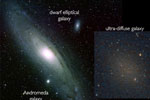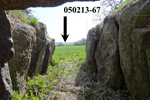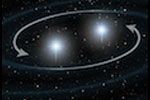News on Astronomy in 2016
Newly formed stars shoot out powerful whirlwinds
14 December 2016
 Researchers from the Niels Bohr Institute have used the ALMA telescopes to observe the early stages in the formation of a new solar system. For the first time they have seen how a powerful whirlwind shoot out from...
Researchers from the Niels Bohr Institute have used the ALMA telescopes to observe the early stages in the formation of a new solar system. For the first time they have seen how a powerful whirlwind shoot out from...
Mystery of ultra-diffuse faint galaxies solved
29 November 2016
 Over the last year, researchers have observed some very faint, diffuse galaxies. The galaxies are as faint as dwarf galaxies, but are distributed over an area just as large as the Milky Way.
Over the last year, researchers have observed some very faint, diffuse galaxies. The galaxies are as faint as dwarf galaxies, but are distributed over an area just as large as the Milky Way.
Site on Mars named after Mars researcher Jens Martin Knudsen
7 June 2016
 The Danish Mars researcher Jens Martin Knudsen has had an area on Mars named after him. The site has been named Knudsen Ridge and has a very beautiful location by Endeavour Crater near the equator.
The Danish Mars researcher Jens Martin Knudsen has had an area on Mars named after him. The site has been named Knudsen Ridge and has a very beautiful location by Endeavour Crater near the equator.
Star with different internal driving force than the Sun
4 May 2016
 Astrophysicists from the Niels Bohr Institute have observed a distant star in the constellation Andromeda with a different positioning of sunspots and this indicates a magnetic field that is driven by completely different
Astrophysicists from the Niels Bohr Institute have observed a distant star in the constellation Andromeda with a different positioning of sunspots and this indicates a magnetic field that is driven by completely different
Easter can be calculated with greater accuracy using new ‘old’ astronomical method
18 March 2016
 Easter can fall early and late, in fact, the timing can fluctuate by an entire month from late March to late April. Using a new astronomical method of calculation, the date of Easter would be better defined as the first Sunday after
Easter can fall early and late, in fact, the timing can fluctuate by an entire month from late March to late April. Using a new astronomical method of calculation, the date of Easter would be better defined as the first Sunday after
Dark Cosmology Centre in hunt for gravitational wave sources
11 February 2016
 Today it was announced that gravitational waves, a key prediction of Einstein’s theory of general relativity, have been directly detected for the first time and astrophysicists from the Niels Bohr Institute’s Dark Cosmology Centre...
Today it was announced that gravitational waves, a key prediction of Einstein’s theory of general relativity, have been directly detected for the first time and astrophysicists from the Niels Bohr Institute’s Dark Cosmology Centre...
The solar system’s ninth planet in sight
26 January 2016
 Two American researchers believe that they have found evidence that there is still a giant planet in our own solar system that we have never seen. It has long been known that the small dwarf planet Sedna moved in a strange
Two American researchers believe that they have found evidence that there is still a giant planet in our own solar system that we have never seen. It has long been known that the small dwarf planet Sedna moved in a strange
